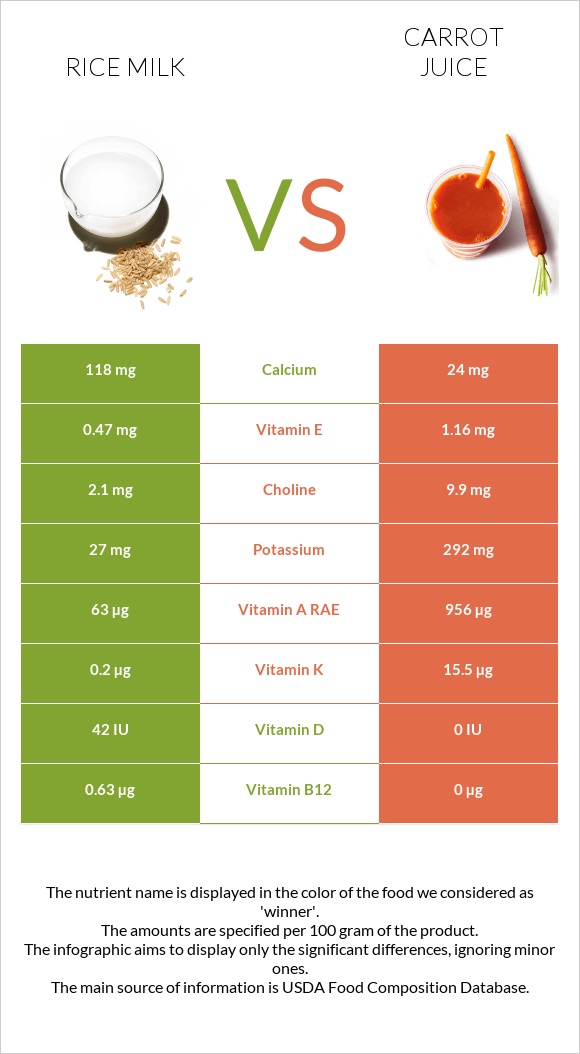Rice milk vs. Carrot juice — In-Depth Nutrition Comparison
Compare
The main differences between rice milk and carrot juice
- Rice milk is richer in vitamin B12, calcium, vitamin D, vitamin B2, and manganese, yet carrot juice is richer in vitamin A, vitamin B6, vitamin K, vitamin C, and potassium.
- Daily need coverage for vitamin A for carrot juice is 378% higher.
- Carrot juice has a lower glycemic index than rice milk.
Food types used in this article are Beverages, rice milk, unsweetened and Carrot juice, canned.
Infographic

Infographic link
Mineral Comparison
Mineral comparison score is based on the number of minerals by which one or the other food is richer. The "coverage" charts below show how much of the daily needs can be covered by 300 grams of the food.
| Contains more CalciumCalcium | +391.7% |
| Contains more PhosphorusPhosphorus | +33.3% |
| Contains less SodiumSodium | -40.9% |
| Contains more ManganeseManganese | +116.9% |
| Contains more SeleniumSelenium | +266.7% |
| Contains more MagnesiumMagnesium | +27.3% |
| Contains more PotassiumPotassium | +981.5% |
| Contains more IronIron | +130% |
| Contains more CopperCopper | +24.3% |
| Contains more ZincZinc | +38.5% |
Vitamin Comparison
Vitamin comparison score is based on the number of vitamins by which one or the other food is richer. The "coverage" charts below show how much of the daily needs can be covered by 300 grams of the food.
| Contains more Vitamin DVitamin D | +∞% |
| Contains more Vitamin B2Vitamin B2 | +158.2% |
| Contains more Vitamin B12Vitamin B12 | +∞% |
| Contains more Vitamin CVitamin C | +∞% |
| Contains more Vitamin AVitamin A | +1417.5% |
| Contains more Vitamin EVitamin E | +146.8% |
| Contains more Vitamin B1Vitamin B1 | +240.7% |
| Contains more Vitamin B5Vitamin B5 | +56.2% |
| Contains more Vitamin B6Vitamin B6 | +456.4% |
| Contains more Vitamin KVitamin K | +7650% |
| Contains more FolateFolate | +100% |
All nutrients comparison - raw data values
| Nutrient |  |
 |
DV% diff. |
| Vitamin A | 63µg | 956µg | 99% |
| Vitamin B12 | 0.63µg | 0µg | 26% |
| Vitamin B6 | 0.039mg | 0.217mg | 14% |
| Vitamin K | 0.2µg | 15.5µg | 13% |
| Vitamin C | 0mg | 8.5mg | 9% |
| Calcium | 118mg | 24mg | 9% |
| Potassium | 27mg | 292mg | 8% |
| Manganese | 0.282mg | 0.13mg | 7% |
| Vitamin B2 | 0.142mg | 0.055mg | 7% |
| Vitamin D | 42 IU | 0 IU | 5% |
| Vitamin E | 0.47mg | 1.16mg | 5% |
| Vitamin D | 1µg | 0µg | 5% |
| Vitamin B1 | 0.027mg | 0.092mg | 5% |
| Iron | 0.2mg | 0.46mg | 3% |
| Selenium | 2.2µg | 0.6µg | 3% |
| Fiber | 0.3g | 0.8g | 2% |
| Phosphorus | 56mg | 42mg | 2% |
| Vitamin B5 | 0.146mg | 0.228mg | 2% |
| Monounsaturated fat | 0.625g | 0.007g | 2% |
| Polyunsaturated fat | 0.313g | 0.071g | 2% |
| Protein | 0.28g | 0.95g | 1% |
| Fats | 0.97g | 0.15g | 1% |
| Magnesium | 11mg | 14mg | 1% |
| Copper | 0.037mg | 0.046mg | 1% |
| Sodium | 39mg | 66mg | 1% |
| Folate | 2µg | 4µg | 1% |
| Choline | 2.1mg | 9.9mg | 1% |
| Calories | 47kcal | 40kcal | 0% |
| Net carbs | 8.87g | 8.48g | N/A |
| Carbs | 9.17g | 9.28g | 0% |
| Sugar | 5.28g | 3.91g | N/A |
| Zinc | 0.13mg | 0.18mg | 0% |
| Vitamin B3 | 0.39mg | 0.386mg | 0% |
| Saturated fat | 0g | 0.027g | 0% |
Macronutrient Comparison
Macronutrient breakdown side-by-side comparison
Protein:
0.28 g
Fats:
0.97 g
Carbs:
9.17 g
Water:
89.28 g
Other:
0.3 g
Protein:
0.95 g
Fats:
0.15 g
Carbs:
9.28 g
Water:
88.87 g
Other:
0.75 g
| Contains more FatsFats | +546.7% |
| Contains more ProteinProtein | +239.3% |
| Contains more OtherOther | +150% |
~equal in
Carbs
~9.28g
~equal in
Water
~88.87g
Fat Type Comparison
Fat type breakdown side-by-side comparison
Saturated fat:
Sat. Fat
0 g
Monounsaturated fat:
Mono. Fat
0.625 g
Polyunsaturated fat:
Poly. Fat
0.313 g
Saturated fat:
Sat. Fat
0.027 g
Monounsaturated fat:
Mono. Fat
0.007 g
Polyunsaturated fat:
Poly. Fat
0.071 g
| Contains less Sat. FatSaturated fat | -100% |
| Contains more Mono. FatMonounsaturated fat | +8828.6% |
| Contains more Poly. FatPolyunsaturated fat | +340.8% |





